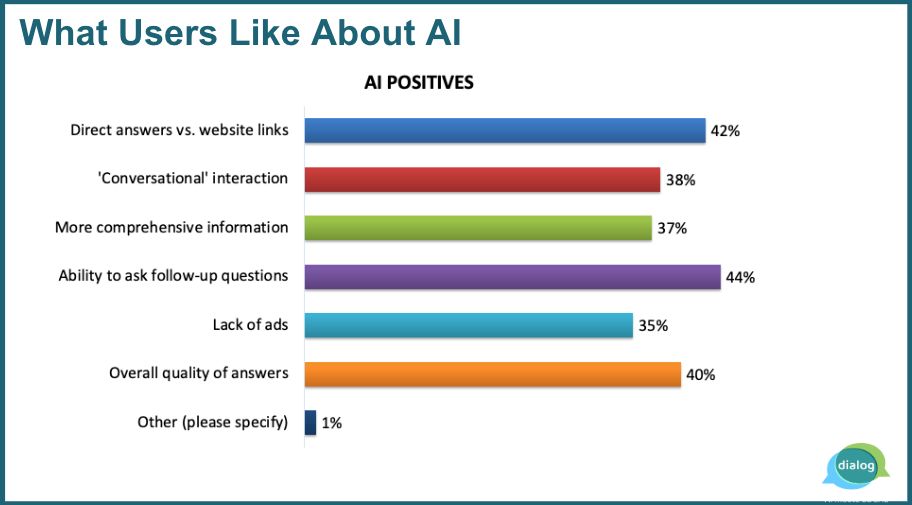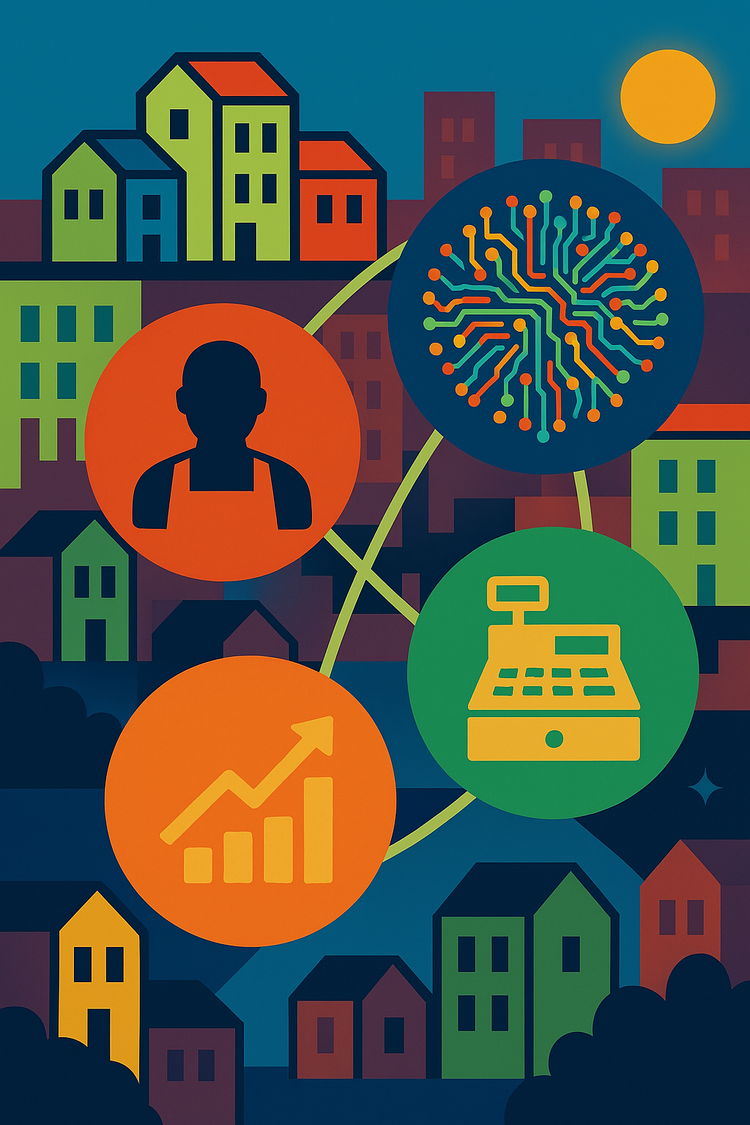AI Faster than Internet, Gaining on Google, Customer Intelligence

See our special 2025 membership offer.
AI Adoption Faster than Internet
Consumer adoption of AI is happening roughly twice as fast as the adoption speed of PCs or the internet in their early phases. That's according to new findings coming out of the National Bureau of Economic Research.
Based on two surveys fielded in June and August, with a combined total of just over 7,5000 US respondents, researchers found that 39.4% of adults (18-64) were using AI two years after ChatGPT’s launch in November 2022 (28% at work), including about 11% who report using it daily. By comparison, the internet reached 20% mass market adoption in 1997. And it took seven years to get to 60% (in 2002). Personal computers reached 20% adoption after three years, following IBM PC’s release in 1981.
In terms of demographic differences, the study found that men were more likely to use AI than women by about 10 points. Younger workers were more likely to adopt than AI than older workers:
- 18-29: 34.5%
- 30-39: 34.6%
- 50-64: 16.7%
Education also influences AI adoption:
- Workers without a college degree: 19.6%
- Bachelor's degree: 39.4%
- Graduate degree: 40.9%
Industry specific adoption is most evident in Finance, Insurance and Real Estate (51%) and lowest in Leisure and Accommodation (15%).
It has to be said that AI adoption is faster in part because it builds on the infrastructure and experience of users with these earlier technologies. The report does not discuss the relative speed of smartphone adoption: it took roughly four years after the iPhone's launch (2007) for smartphone penetration to reach 35% of US adults.

News & Noteworthy
- Yelp launches new AI features, including AI review insights.
- OpenAI releases AI video generation tool Sora.
- UK based Lawhive is coming to the US to disrupt consumer legal services.
- Salesforce CEO Benioff claims AI agents will create an "unlimited workforce."
- Microsoft AI chief Mustafa Suleyman on AI today and where it's going.
- ChatGPT and Gemini still make a lot of mistakes.
- Widespread deployment of AI for customer service could backfire.
- 48 hours in Tokyo with my AI travel companion.
- Amazon surprises with Nova, its own gen-AI foundational models.
- Google's quantum computing breakthrough will (ultimately) boost AI.
- New Solos smart glasses powered by OpenAI cost $299.

Survey: AI Gaining on Search
Dialog's just published "search vs. AI" consumer survey found that 44.3% of US adults have ever tried an AI application like ChatGPT. This is a few points higher than the findings from the National Bureau of Economic Research study (above). Our survey was fielded in November and had 1K respondents.
Among all respondents, who have used AI, 57% did so daily (25% of all adults). And a substantial percentage of that group use it multiple times a day.
The survey also sought to assess consumers' comparative usage of search and AI to determine whether there's any movement toward AI and away from traditional search. Overall, search is still preferred to AI as a tool for finding information across a broad range of categories. But that's not the end of the story.
Consumers like many aspects of the AI user experience and the majority (61%) said they trust AI results. Nearly half of respondents said they regarded AI and search engines as interchangeable. And more than two-thirds of respondents believed that traditional search would be replaced by AI within three years.


'Reputation Management' into 'Customer Intelligence'
Just as technology advancements prompted the evolution of "call tracking" into "call intelligence," what's currently called "reputation management" will become "customer intelligence." It's probably somewhat more complicated but that's basically the direction the market will take – driven by new AI-enabled capabilities and a host of AI-powered startups seeking to disrupt the current "legacy" players.
AI makes new capabilities available that will allow reputation companies to better collect and mine customer conversations across the internet for deeper insights about the customer experience, customer wish lists, product or service issues and so on. Reviews have often contained this information but companies basically ignored it, just as nobody listened to call recordings or read transcripts until the technology made it possible to summarize and mine them for insights.
Had Starbucks been doing some version of this it could have caught problems much earlier and probably wouldn't have lost customers and now have to dig itself out of a hole.
There are three interrelated questions here: AI capabilities, target customers and market positioning. AI's ability to analyze unstructured data and extract insights will enable it to digest a wider array of inputs online. Reputation management companies that sell into national brands, multi-location businesses and franchises will expand their sources to the full spectrum of review sites, social media and forums (e.g., Reddit) to create a more holistic picture of customer feedback – and extract deeper insights than were previously possible. This may/will kill NPS and probably impact the "customer experience" or "voice of the customer" survey business (e.g., Qualtrics). Accordingly, multiple functions and segments will start to bleed into one another, creating more competition but also more M&A activity.
For companies targeting agencies that serve SMBs or SMBs themselves, which largely are focused on the ranking impact of reviews, the positioning will probably remain "review management," though product capabilities will expand.
All of this is exciting from a technology perspective but recapitulates positioning challenges for many of these companies. If you visit G2 or Capterra and do a search for "reputation management" or "review management," you get hundreds and hundreds of results. Even if you filter aggressively you still get dozens.
Like so many core B2B services there's a major challenge differentiating. That's unlikely to change; and now everybody has AI too. But delivering real value at a competitive price and being intensely customer centric with product development is a place to start.

Dialog: Year in Review, AI Outlook 2025
Join us for the Dialog's year in review and 2025 outlook webinar on Wednesday, December 18. You'll receive a separate email invitation with more details. Neal Polachek and I will look back at our data and "what we've learned" in 2024 and then ahead to next year, which is certain to be even more eventful. Mark your calendars.
Funny | Weird | Sad
- ChatGPT outperformed doctors diagnosing patients.
- AI models are capable of lying and scheming to accomplish their goals.
- AI is creating a "mind tax" for people who use it every day.
- Many parents are unaware of how their teens use AI.
If you're not getting this in your in-box, you know what to do...





